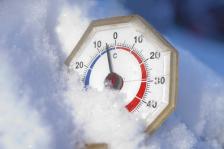How to Prevent and Treat Hypothermia
Hypothermia is both preventable and easily treatable in its early stages, but if ignored, can rapidly progress – and even become fatal. If you are planning on spending any time outdoors this winter, these tips from House Call Doctor will help you learn how to identify, prevent, and treat hypothermia.

Hypothermia is easily preventable, and easily treatable in its early stages. But if ignored, it can rapidly progress – and even become fatal. (It’s also important to note that accidental hypothermia occurs throughout the entire world, even in places with warmer climates.) If you are planning on spending any time outdoors this winter, it’s crucial to learn what exactly hypothermia is, and how to prevent and treat it in both yourself and your loved ones.
Sponsor: Want to save more, invest for the future, but don’t have time to be a full-on investor? Betterment.com helps you build a customized, low-cost portfolio that suits your goals. Learn more.
What is Hypothermia?
Hypothermia is the cooling of the body temperature to below normal levels, which is defined as below 95 degrees Farenheit, or 35 degrees Celsius. (Normal body temperature is defined as 98.6 degrees F.arenheit.) The severity of hypothermia depends on how much below 95 degrees a person is, and the categorized as mild, moderate, or severe hypothermia accordingly.
The danger occurs because when the body cools down to that level, if often has a difficult time warming up by itself – which is why it can be potentially fatal, if not treated quickly and appropriately.
Symptoms of Hypothermia
It’s always best to deal with hypothermia early on, since the earlier you treat it, the less the chance of complications and risks. Therefore, it’s vital to recognize any early symptoms and seek medical care immediately. Here are some potential symptoms of hypothermia:
- Shivering (be careful, though, as not everyone with hypothermia shivers)
- Numb hands or feet
- Bluish skin discoloration
- Confusion
- Memory changes
- Loss of balance
- Rapid breathing
- Rapid heart rate
- Frequent urination
- Difficulty speaking
- Drowsiness or fatigue
- Hallucinations
Note that once hypothermia progresses, people can stop shivering and can even become unconscious.
Who Gets Hypothermia?

While anyone can get hypothermia if exposed to cold temperatures for long enough, those with more fragile bodily functions are often at higher risk. This includes infants, children, and the elderly, as well as the homeless, and those with certain mental illnesses.
Besides exposure to the cold, there are also other risk factors for developing hypothermia, including:
- Hypothyroidism
- Medications (sedatives, antidepressants, antipsychotics, beta blockers, clonidine, certain diabetes drugs, and narcotics)
- Excessive alcohol intake
- Sepsis (severe infection in the blood stream)
A Note About the Elderly and Hypothermia
It’s very important to look out for hypothermia in the elderly, as they not only have a diminished neurologic and temperature response systems due to their age – which may leave them unable to “notice” if they are truly cold – but they often suffer from chronic health conditions and take medications that might further suppress their systems. They also tend to ignore early symptoms due to decreased access to care and transportation, or because of social isolation. So, they are at very high risk.
Treatment of Hypothermia
It’s absolutely crucial to treat hypothermia as early as possible in its progression, and very quickly. The more rapidly it is recognized and care is received, the less likelihood of complications and death.
Here are some tips on how to approach a person with possible hypothermia risk:
- Call 911 if you suspect hypothermia.
- Move the person to a warmer environment asap. If they are outside, bring them inside; if they are in cold water, get them out and on to land / the floor.
- If they are wet, remove their wet clothing.
- Cover them with dry clothes and warm blankets. The goal is to warm them up gradually, not rapidly. Do not submerge them in warm or hot water, as this can induce a life-threatening heart arrhythmia in those with hypothermia.
- Have them drink something warm, if they are able to. Avoid alcohol or caffeine.
How to Prevent Hypothermia
Most importantly, if you or your loved ones (especially babies, children and elderly family members) will be spending any time outdoors in the winter, be sure to:
- Wear layers of clothing
- Wear a hat, gloves, and mittens
- Limit time spent outside
- Avoid alcohol when spending time outside
- Check on elderly family members who live alone. Make sure they are equipped to stay warm in the cold weather: do they have a working heater? Easily accessible blankets? Are they able to dress themselves properly to stay warm?

Share your ideas and learn more quick and dirty tips with us on the House Call Doctor’s Facebook and Twitter pages. You can even find me on Pinterest!
Photos of hot drink and cold thermostat courtesy of Shutterstock.
Please note that all content here is strictly for informational purposes only. This content does not substitute any medical advice, and does not replace any medical judgment or reasoning by your own personal health provider. Please always seek a licensed physician in your area regarding all health related questions and issues.






